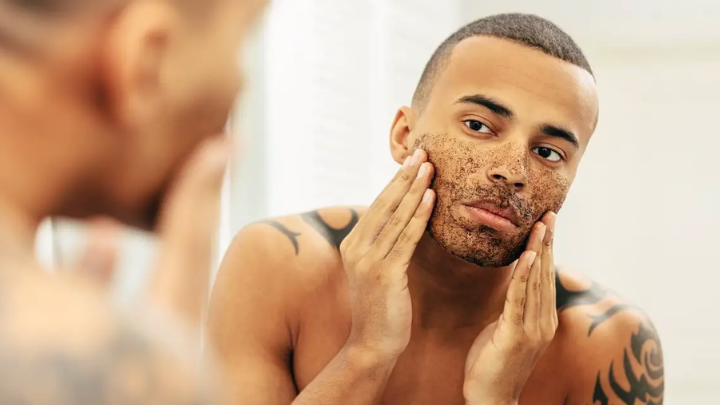What the hell is Exfoliation? The one skin term every man throws out they need but has no idea what it means…Skin exfoliation is the process of removing dead skin cells from the surface of the skin. This is something you do not do everyday!
Exfoliation is the process of removing dead skin cells from the surface of your skin. By incorporating exfoliation into their skincare routine (Opens in a new window), men can achieve a smoother, brighter complexion. Exfoliating helps address common skin concerns like acne, blackheads, and ingrown hairs, while also promoting a more even skin tone and refined appearance.
It's an essential step to unlock healthier-looking skin and improve overall grooming results, but it must be done properly or you can really damage your skin. In this blog, we will dive into the different types of exfoliations and how to exfoliate your skin like a pro.
5 Benefits of Exfoliating for Men
1. Make Your Skin Smoother
Exfoliating helps make your skin smoother by removing dead skin cells and unclogging pores, resulting in a more polished appearance and texture.
2. Make Your Complexion More Even
Regular exfoliation can even out your complexion by promoting the shedding of dull and uneven skin, revealing a brighter and more youthful appearance.
3. Make Your Pores Appear Smaller
By removing debris and excess oil from your pores, exfoliating can make them appear smaller and less noticeable, giving your skin a smoother and refined look.
4. Prevent Acne and Blackheads
Exfoliating can help prevent acne and blackheads by unclogging pores and reducing the buildup of oil, dirt, and dead skin cells that contribute to breakouts and blemishes.
5. Prevent Ingrown Hairs
For men who shave regularly, exfoliating can prevent ingrown hairs by removing dead skin cells that can trap hair follicles and cause painful and unsightly ingrown hairs.
How to Exfoliate Your Face
1. Choose an Exfoliant
There are two main types of skin exfoliation: physical exfoliation and chemical exfoliation.
Physical exfoliation involves physically scrubbing or brushing the skin to remove dead skin cells. This can be done using abrasive scrubs, exfoliating brushes or cloths, microdermabrasion, or facial cleansing devices. Physical exfoliation is effective but can be harsh on the skin, and can lead to micro tears. Everyone knows the deep clean exfoliating face wash scrub face wash that you could actually feel scrapping your skin with those beads. It's important to choose gentle products and not overdo it.
Chemical exfoliation involves using acids or enzymes to dissolve dead skin cells. This type of exfoliation is often safer and more effective for your skin and more than physical exfoliation if done correctly… There are two main types of chemical exfoliants: alpha hydroxy acids (AHAs) and beta hydroxy acids (BHAs). AHAs, such as glycolic acid and lactic acid, work on the surface of the skin to break down dead skin cells and improve skin texture.
Both physical and chemical exfoliation have their benefits and drawbacks, so it's important to choose the right method for your skin type and concerns. It’s important to exfoliated a few times a week but you can not do it everyday and overdo it as you can damage and irritate your skin. We recommend chemical exfoliates as they are proven to be more effective and physical exfoliates again can lead to micro tears in the skin.
2. Wet Your Face
Before exfoliating, wet your face with lukewarm water. This helps soften the skin and prepare it for exfoliation.
3. Massage the Scrub Into Your Face
Apply the exfoliating product onto your fingertips and gently massage it onto your face using circular motions. Avoid applying excessive pressure to prevent skin irritation.
4. Rinse with Lukewarm Water
After massaging the scrub into your skin, rinse your face thoroughly with lukewarm water. Make sure to remove all traces of the exfoliant from your skin.
5. Towel Dry Your Face by Dabbing Gently
Once your face is rinsed, gently pat your skin dry with a clean towel. Avoid rubbing the towel harshly against your skin to prevent irritation.
How Often Should Men Exfoliate Their Face?
It's important to exfoliate a few times a week, but not every day, as excessive exfoliation can damage and irritate your skin. As a general guideline, men should aim to exfoliate their face 1-3 times per week. However, adjust the frequency based on your skin's reaction. If you experience irritation or excessive dryness, reduce the frequency. Consult with a dermatologist for personalized recommendations.
Should Men Exfoliate Before or After Shaving?
It is generally recommended for men to exfoliate before shaving. Exfoliating before shaving helps to remove dead skin cells and unclog pores, allowing for a smoother and closer shave. It also helps to lift the facial hair, making it easier to cut and reducing the likelihood of ingrown hairs. By exfoliating first, you can prepare the skin and optimize the shaving experience. After shaving, it's important to moisturize the skin to replenish moisture and soothe any potential irritation.
Don’t Forget to Moisturize!
Moisturizing after exfoliating is important to replenish hydration and nourishment to the skin. Exfoliation can temporarily strip away some of the skin's natural oils (Opens in a new window) and moisture, leaving it more prone to dryness and potential irritation. By applying a moisturizer after exfoliating, you help to restore the skin's moisture barrier, keeping it hydrated and balanced. Moisturizers also help to soothe the skin, reduce redness, and provide essential nutrients to support healthy skin regeneration. It’s important to find a gentle moisturizer like PrettyBoy's Revival (Opens in a new window) that is jam packed with hydrating soothing ingredients. With using a strong product like an exfoliate, it’s important to use a gentle cleanser that can help rebuild that skin barrier. Overall, moisturizing after exfoliation helps to maintain a smooth, supple, and well-hydrated complexion.




